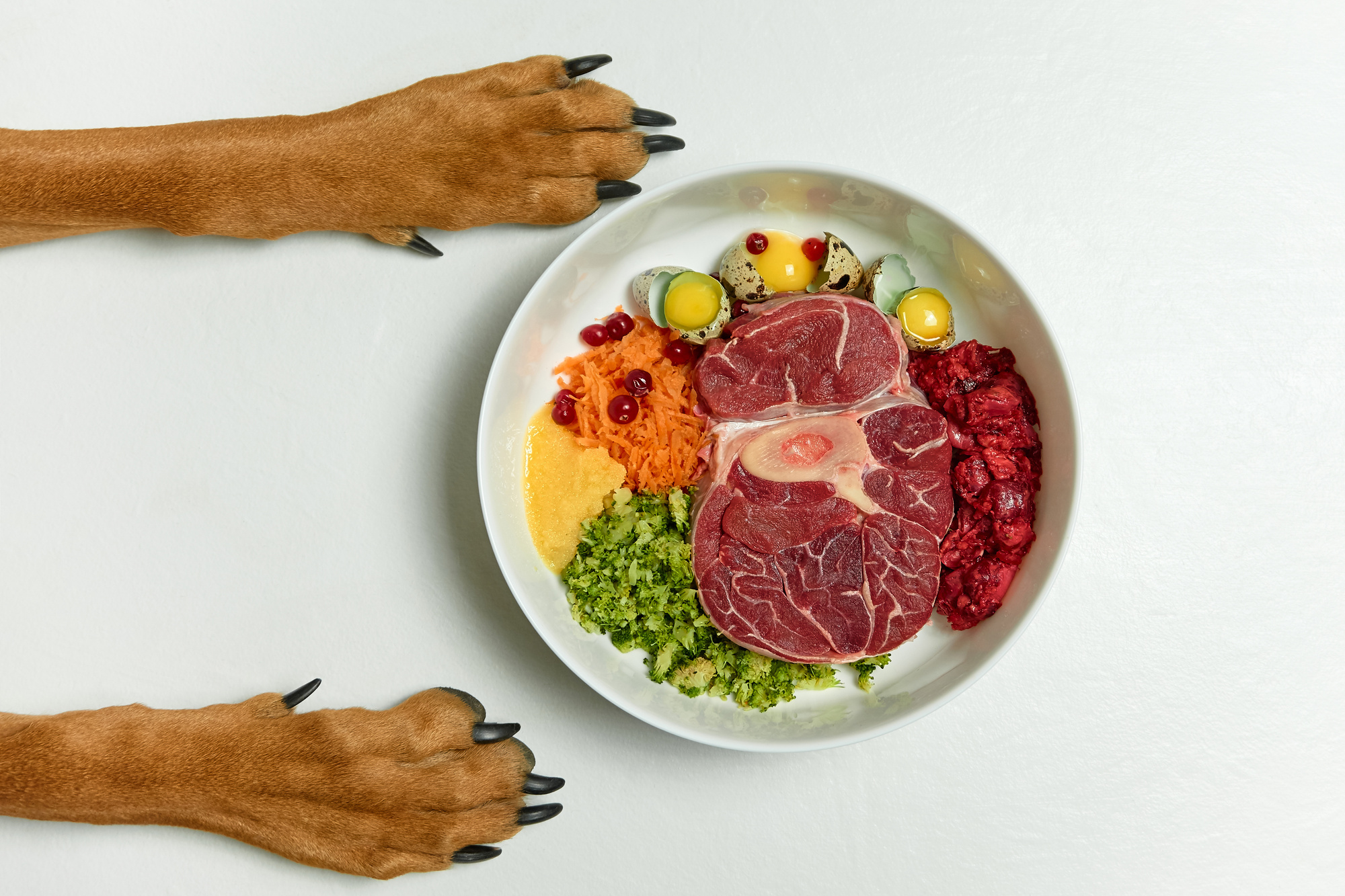Many beloved older dogs start slowing down on family walks due to stiff joints or lagging energy. However, something as simple as a nutrient-rich diet plan tailored by a pet nutritionist could get them frolicking like puppies again.
Your pet’s health and longevity begin with choosing the proper diet. Think of their diet as a balanced plate: a mix of proteins, fats, carbohydrates, and vitamins in the right proportions. This guide will show you how to prepare a balanced diet to promote your dog’s health.
Understanding Your Dog’s Nutritional Needs
Much like humans, a dog requires at least six core nutrients. These nutrients are essential for proper growth and long-term health, and they include:
- Proteins
- Fats
- Carbohydrates
- Vitamins and minerals
- Water
A dog’s dietary requirements change based on their age, breed, size, physical activity, and health conditions. For example, large-breed puppies require controlled calcium for healthy bone development. Various recipes and formulations in foods like Open Farm Dog Food cater to dogs’ different life stages and sensitivities. Misconceptions like “dogs should mainly eat meat” or “grains are just fillers” may lead owners astray from balanced nutrition principles.
Building The Balanced Plate
- Proteins
As omnivores, dogs have evolved to digest and benefit from both animal and plant-based proteins. Lean beef, pork, lamb, and chicken are excellent sources of high-quality protein. Additionally, fish and eggs, shell included or not, are also excellent choices. Essential amino acids in proteins aid in developing muscles and organs and bolster immune health.
While they require ample proteins from animal sources, they can also derive nutritional benefits from certain plant-based ingredients. Some dogs could do well on vegetarian proteins like legumes, but these often lack complete amino acid profiles, so you must carefully supplement them.
- Fats
Dogs also need dietary fats, which supply energy-dense calories and aid skin and coat health. Chicken fat, egg yolks, fish, nuts, or olive oils provide concentrated sources of essential fatty acids. Limit feeding your dog low-cost kibbles with unhealthy saturated or trans fats that stress liver function.
- Carbohydrates
In the proper ratios, digestible carbs like whole grains, certain fruits, and starchy vegetables supply dogs with critical glucose for energy needs. Complex carbs break down slowly, avoiding dangerous blood sugar spikes. However, excess simple carbs from refined flour and sugars lack nutritional value and may promote obesity and diabetes.
- Fiber
While not a classical nutrient, dietary fiber plays a vital role in healthy digestion. Soluble fibers in foods like oats and peas act as prebiotics to support gut microbiome balance. This helps in stabilizing blood sugar levels and insulin response.
Insoluble fibers in wheat bran, vegetables, and whole grains promote bowel motility and help prevent constipation. Increased fiber levels not only curb your dog’s hunger but also aid in weight management and healthy anal gland function.
- Vitamins and Minerals
Nutrient-rich foods such as organ meats, leafy greens, and legumes contribute to a balanced diet. They provide essential vitamins and minerals that support overall health, including joint, gut, and heart health, as part of a diverse and complete diet.
Talk to your vet about suitable supplements for your dog. It’s important to ensure that supplements, such as calcium, are given in appropriate amounts, especially for large breed puppies, to avoid developmental issues.
- Water
After proteins, water represents most of your dog’s body weight. Ensure ample hydration for removing wastes, cushioning joints, temperature regulation, and transporting nutrients. Always provide your dog with fresh, clean water. Add broths or wet food to increase moisture consumption if needed.
Practical Tips For Crafting A Nutrient-Rich Diet
- Homemade vs. Commercial Food
Some owners prefer homemade diets for their control over ingredients and transparency, especially when using raw or fresh food. However, formulating complete, balanced home-cooked meals demands substantial effort and nutritional knowledge. High-quality commercial foods carefully developed by Ph.D. canine nutritionists provide convenience plus optimal nutrition. Rotating commercial diets also helps prevent developing food intolerances.
- Portion Control
Using manufacturer feeding guidelines or consulting your vet ensures proper daily caloric intakes suited to your dog’s needs. Weighing food portions rather than estimating by volume increases accuracy. Keep a record of how much your dog eats to manage their weight goals. Portion control can prevent obesity and related illnesses.
- Treats and Supplements
Factor healthy treats like bits of lean meat, tuna, eggs, or cheese into your dog’s daily calorie allotment. Prioritize digestible whole food sources over synthetic vitamins whenever possible. Discuss breed-specific dog vitamins and supplements with your veterinarian as needed.
Avoiding Dietary Pitfalls
Many well-intentioned owners inadvertently aggravate health issues by overfeeding treats, giving table scraps with onion or garlic, or allowing access to bits of chocolate. Implementing consistent dietary rules and training effectively manages your dog’s eating habits. Consistency in feeding and treating also helps maintain a healthy diet and prevents overfeeding.
If your dog shows symptoms like consistent itching or diarrhea, consider restricting their diet to a single novel protein source for several weeks to identify problem ingredients. Slowly reintroduce other foods afterward. Recurring skin, ear, and bowel issues may indicate underlying food allergies or sensitivities.
Discuss customized elimination diet trial protocols with your veterinarian to pinpoint and avoid specific triggers. Regular checkups enable your vet to make professionally tailored nutritional adjustments as your dog’s lifespan and activity levels evolve.
Conclusion
Crafting a properly balanced, nutrient-rich diet is the foundation for your dog’s health, happiness, and longevity. For more guidance, consult veterinary nutrition specialists for science-based advice tailored to your faithful companion. By providing essential nutrients in optimal ratios, you help ensure a healthy and joyful life for your furry friend.
Infographic provided by Albright’s Raw Pet Food, a provider of raw beef pet food
Photo credit:
Did you find this city dog content helpful? Share it with a friend or link it to social media. Enjoy short clips of silly dogs? Best dog training videos? Holistic puppy training tips? Follow us on instagram @nydognanny or on YouTube at nydognanny. Have some news you needs to get to dog and cat parents stat? Email info@newyorkdognanny.com with your article pitch.




